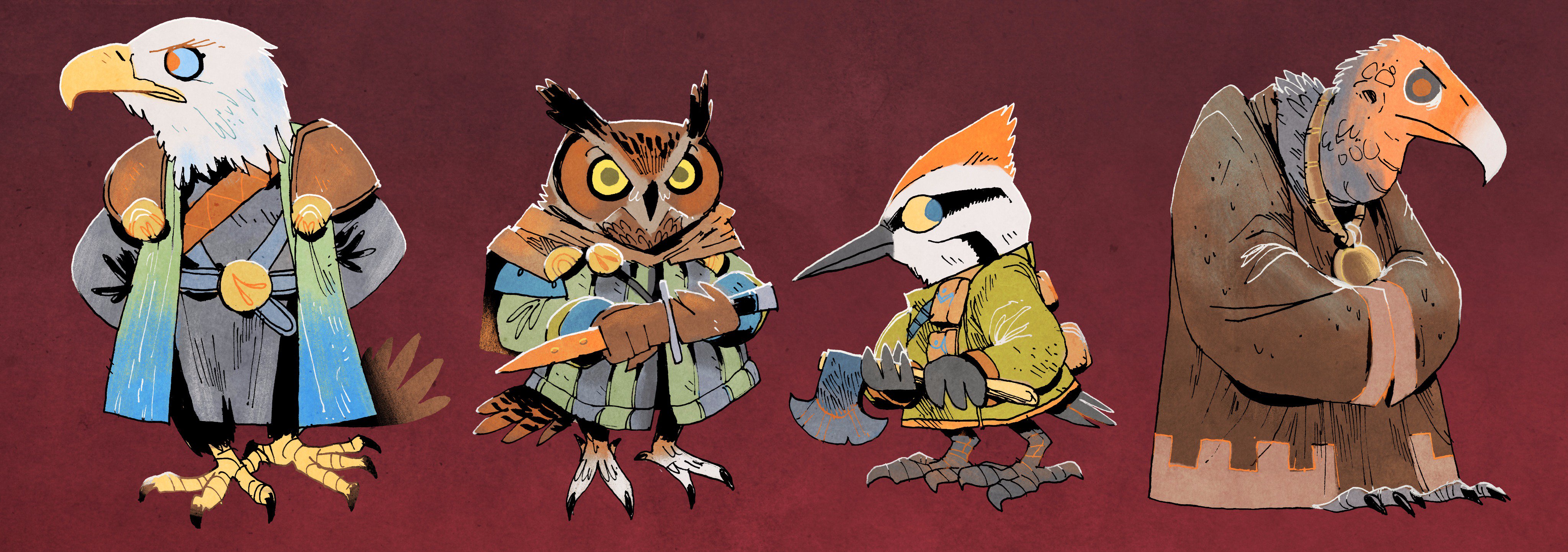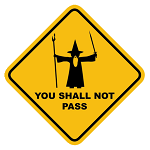|
The logistics in 40K would be impossibly difficult* even if the Imperium was a post scarcity democracy. *unless the managed to invent R2D2
|
|
|
|

|
| # ? May 24, 2024 23:49 |
|
Josef bugman posted:The thing is that in 40K it isn't really satire. I don't think it has been for much of my adult life. If the "point" was that it was satirical then it missed the boat sometimes form the mid 90's onwards. You talking about Warhammer Fantasy in that last sentence, or what?
|
|
|
|
Sorry, yes Fantasy in the last bit. Cains fun, but it's still very big on the Imperium. Who in any sane setting are still villains.
|
|
|
|
Ghost Leviathan posted:More people die daily to keep Arby's open I mean, a bit of extrapolation fixes this up a bit. Any time they get low on supplies they just kidnap a loyal planet's population and overwork them to death to make up the deficit in the region. Just look at what happened on Armageddon where they kidnapped the survivors of the war and put them into labor camps to work to death. Insert bullshit excuses about them being heretics, how loyal servants will happily die Aside from that, if worlds are being segmented into sectors then it makes sense that each sector should be self sufficient to a certain extent and far easier to manage logistically. Unless they really are badly managed as the profusion of corrupt planetary governors and other incompetent officials infers they are. IE: The agri world provides food for the hive worlds, the hive worlds provide meat for the grinder, the forge world provides weapons and replacement parts for the hive and agri worlds, etc, etc. Which would handily explain why every featured battle on the planet Backwater 9 of the I Can't Believe Some of These Dipshits Turned to Chaos Yet Again star system is "A battle for the fate of the sector!" or some such nonsense. If the agri world goes people starve to death and billions die from supply failures before there's enough soylent green to go around since the deficit can't be made up without killing even more people. Rogue Traders can only make up so much of an entire planet's needs and besides, that assumes the governor is beneficent enough to pay whatever cut throat prices they'll have on offer during a time of famine. And that the governor is willing to risk being executed If the hive world goes then you've got billions of people that have to be killed before they can kill billions more due to being turned to chaos. Just look at how (insert pretty much any situation where a hive world fell here) could have gone. Or just how things went in one of the companion hive cities to Vervunhive in particular. An entire hive city was turned into technologically induced war slaves for the invaders that then spread out to siege the other hives and if successful probably would have done the same to the survivors. If the forge world goes then billions die as the forge world starts churning out possessed titans and all sorts of technological terrors as the surviving Mechanicus demonstrate why they should have never been entrusted with humanity's technological records. Meanwhile, this situation is extra hosed since forge worlds provide necessary equipment for hive worlds and agri worlds, meaning people are going to die or experience a very violent technological de-evolution as they can't maintain their tech which maintains their way of life. Double up on that again with the fact that whatever guardsmen and space marines that are sent to clean up this mess can't get easy access to ammo, armor, and other supplies and you have a recipe where things might devolve further to where it becomes a massive conflict zone or the exterminatus gets whipped out. This is kind of gone into in the various books centered on the Imperium getting invaded. But I don't think it's never out and out said why everything is so fragile and why so much can go wrong so fast. Which kind of defeats the point of it being satire since fascists will take the whole "glorious struggle" part of the fluff and ignore the whole "because these people are loving incompetent, corrupt, and bigoted as hell to the point that their way of life and ideology is counterproductive to success.". It can still potentially work as satire to show how utterly inefficient the Imperium is as a totalitarian state. The guys who go on about how necessary their evil is are hardly as competent or trustworthy as they'd like you to believe they are since they're used to the waste of human lives to the point of it being impromptu or default policy. Fascists actually didn't make the trains run on time and all that jazz, y'know? Archonex fucked around with this message at 19:27 on Apr 26, 2022 |
|
|
Archonex posted:Fascists actually didn't make the trains run on time and all that jazz, y'know? The Squats can, though https://www.youtube.com/watch?v=usJRU4djnrE
|
|
|
|
|
Telsa Cola posted:It's somewhat hinted at that if you could cure Plague Marines some would probably stop being chaos space marines. That actually happened in Age of Sigmar.
|
|
|
|
Nvm
|
|
|
|
Yvonmukluk posted:That actually happened in Age of Sigmar. Huh. loving over Chaos by stealing the souls of Chaos Champions who have a chance for redemption, turning them into fantasy Space Marines and allowing them to repent for their past by kicking the rear end of Chaos is the first genuinely cool idea I saw to come out of the whole "Stormcast Eternals" concept.
|
|
|
|
Age of Sigmar is a funny one given it came out just as they had the big management change, and seemingly went 'Aw gently caress, we literally burned one of our beloved settings to the ground and pissed off all our fans with lovely half-assed rules and minis, how do we turn this into an actual setting?' Meanwhile, Total War Warhammer makes tons of money with that setting they're currently selling no merchandise for and had canonically completely destroyed.
|
|
|
|
Age of Sigmar is great and I really want to combine it with my other new love, Shadow of the Weird Wizard, to play a bunch of grade-D adventurers trying to survive the painting on the side of a van.
|
|
|
|
Tibalt posted:Age of Sigmar is great and I really want to combine it with my other new love, Shadow of the Weird Wizard, to play a bunch of grade-D adventurers trying to survive the painting on the side of a van. I'd play that campaign. And also buy that album. And, of course, drive that van.
|
|
|
Itís been a minute since Iíve written about Root, and since fascism has been mentioned I may as well bring up the faction that best depicts the ideology, The Lord of the Hundreds. Youíre the true voice of this Woodland. Dissenters will burn So the Lord of the Hundreds (LotH for short) and the other faction added in the Marauders expansion arose from a design problem. The Vagabond, the guy playing an RPG rather than an army game was overtuned; able to become quite powerful and score quite quickly while the other factions are not rewarded for fighting them. The Vagabond has received numerous nerfs over time to his ability to score points by battling and more factions in the game means more opportunities to leave the vagabond out entirely. But this creates a problem since items, ruins and forests are a core part of the game that are either not important or not interactive when the Vagabond isnít around. Enter the LotH, a faction initially designed to have lots of warriors and interact with items and ruins.  The LotH represents a pretty classical view of populist fascism, with a strongman Warlord piece (the warrior on the left with a flag) that can only be defeated by battling it who has an ever-shifting set of moods. Even then defeat isnít permanent, as new warrior is able to take the reins on the next turn. The torch & pitchfork tokens represent Mobs, who burn down any non-Rat buildings or tokens in a clearing every morning, then spread randomly to adjacent clearings. They even remove Ruins, which presumably captures a disregard for history outside of the LotHís genocidal project. And genocide is whatís happening here, as the Rats score Victory Points and gain legitimacy by making sure that the clearings they own are free of opponentís pieces. Their gameplay revolves around the Warlord piece, who recruits warriors to himself, makes massive marches around the table, and grows in ability as he gains items. Gaining items though has the trade off of locking away some of his Moods.  The interplay between cards and items and the LotH is an interesting one though, since it tips Coleís hand. The LotH has incredibly poor card draw, relying on a specific Mood to ever draw more than one card. In Rootís political language this means the Warlord is actually not great at recruiting ďcommon folkĒ to his cause, despite getting a constant stream of free warriors and mobs each turn. And the way he interacts with items, choosing to either take the points or the item itself, implies a greedier relationship with this mechanic than other factions. Only the Warlord keeps the wealth created by his horde, and heís capable of looting more from the opposing factions. So we know who the Warlord is. Heís Hitler, Mussolini, Duerte, Trump. Heís every pompous tinpot dictator that makes a showy display of power, wealth, and chauvinism; and is rewarded with unwavering support by what his opponents see as a horde of mindless sycophants. But if thatís who the Warlord isÖ then who are the Rats? Are they an invading army seeking lebensraum? Maybe. But the mobs incited by the LotH can pop up anywhere in the forest, and the rats can be recruited from any clearing the Warlord walks through. Are they the lumpenprole? A group thatís always been in the Woodland, but one that ignores politics until called to unadulterated violence? Did the Rats silently resent their mouse and rabbit neighbors until they were given permission to slaughter them? Do such people live around us too? I donít like to think about it.
|
|
|
|
|
I've heard a lot of explanations of what fascism is or isn't or could be over the last few years, and one of the big things I've taken from it is that there's some element of mystery and the unknown to most cases of the rise of fascism. The specifics may get studied to death so that people can understand how it happened, but fascism doesn't crest into a major force on its own without people in large numbers underestimating whatever its initiating elements were. Of course, after coming into being, whatever secret force it harnessed to come into being doesn't give it some extra acuity for broader appeal after the fact. I've heard it described as an un-ideology, because it's not just irrational, it can seem totally incoherent if you don't really share the underlying sentiments. Although I think you could also interpret the Lord of the Hundreds more broadly to various forces that come from somehow outside the traditional power structures, either overlooked from within or coming from without. There's plenty of examples of that throughout history, even without "proper" fascism being a factor. Not being hooked into any other power structures and being unconcerned with bureaucracy or also makes them more reliant on their leader (and possibly you could cast some of the forces being apparently recruited from the void as routed troops finding their way back to the main force). Even the best leaders, if too much goes through them directly, will end up showing the capriciousness of their basic humanity. Most people aren't the best leaders either. Either way, they're what you get when you're unconcerned with bureaucracy or aristocracy or popular opinion and have a group that just has one guy in charge that they follow.
|
|
|
|
No one has mentioned the Eyrie, so I might as well take a swing at it. Focault in the Woodland In a moment of weakness the Marquise descended. Now you have rallied your strength and are poised to recapture your birthright.  If I were to describe the Eyrie play-style, I would say "Liberal Coalition Simulator". You start with two cards in two of the slots at the top of your playmat (your decree), then add one more a turn. The cards themselves decide what, how much, and where you must do things. If, for instance, you have a rabbit card in your Build column, every turn you MUST build a roost in a Rabbit clearing. If you cannot, you enter "turmoil" lose all your deployed cards, lose some victory points, and need to select a new leader. Why is this "Liberal Coalition Simulator"? If you consider each card to represent support, by placing a card in your decree you are promising X to a faction with its own wants and needs. Inevitably, due to limited resources, you will be unable to meet these demands, and the circular firing squad begins. You then choose a new face (and two slightly different columns to start in) and "this time, it will be different". So, how do you "win" as the Eyrie? Always. Punch. Left. The Woodland Alliance and Vagabond are your greatest threats, the Alliance in particular, due to how it operates everywhere at all times. Invest in the police state by keeping your recruitment up, build bridges to nowhere by throwing any unneeded cards into move, and remember, the cat is your rival, but the mice? they are your enemy.
|
|
|
|
I bought Root for my wife's bday based on the original posts, it slaps. Great gameplay, great concept, great idea to turn it all into woodland critters. Edgar Allen Ho fucked around with this message at 21:28 on May 20, 2022 |
|
|
|
How complicated is it? I like to buy anew board game very summer to play on vacation with my kids ages 12-16. Is it a pain to learn and play?
|
|
|
|
Scratch Monkey posted:How complicated is it? I like to buy anew board game very summer to play on vacation with my kids ages 12-16. Is it a pain to learn and play? Root is pretty darn complicated. Of course, every board gamer has different levels of what they think is complicated, so it will depend on your personal experience and preferences. On most scales, this one is certainly up there, and that is due in large part to one big selling point of the game: its asymmetry. Each faction plays very differently, sharing only a small core set of rules. Of course, that means you as the Rules Person will need to know how to play all the factions to teach others. Here's a quick and dirty rules video that goes over the basics. (Don't worry about the silly sketch at the beginning, the rest is played much more straight.) Root is a very common topic over in the Board Games thread, so you might get some advice over there. Also, I hear the OP is a true visionary  and modest too. and modest too.
|
|
|
|
Is that the rules themselves are super complex, or is it just that asymmetric design means there are X times as many rules where X is the number of factions? Those are both complex but they have totally different implications for teaching, e.g. the latter means only the teaching player needs to have the full hurdle. (Iím also in a similar situation and the former would be much harder than the latter.)
|
|
|
|
I think it's very doable for 12-16 assuming it's something they're into and not like "god my parents are forcing me to play this stupid board game" If you've got the time and energy to be the rules-knower it's a great pick. I'm blessed because my wife is also a nerd though so caveats apply.
|
|
|
|
I've played Root with tweens and teens (who are already predisposed to board games), it's a hit.
|
|
|
|
Xiahou Dun posted:Is that the rules themselves are super complex, or is it just that asymmetric design means there are X times as many rules where X is the number of factions? It's a little bit of both, but primarily the latter. The rules are moderately complex. There is a difference between a pawn and a warrior, there is a difference between a building and a token. Also, many cards will have two suits shown on them, and those suits might not match, one being the actual suit of the card when using it for something other than its own effect, the other is the requirement to craft the card for its own effect. Also, there is card crafting but there is also a subset of card crafting which is item crafting which you also need to keep distinct for certain other rules. Also, there is a rule called Rule which is fairly intuitive but has a vital exception. They aren't too bad once you get your feet under you, and these rules apply to all or at least most factions equally. The real complexity comes in the individual factions. One is a resource production industrialist faction with straightforward actions, one has expandable actions but the actions are mandatory and failure is punished, one is a sort of a card collection faction of underground resistance, and one is a personal role playing game. Each individual faction is not too bad, but it's keeping them all in mind to know what can be done that is the tough part.
|
|
|
|
Scratch Monkey posted:How complicated is it? I like to buy anew board game very summer to play on vacation with my kids ages 12-16. Is it a pain to learn and play? I think it's more complicated than a lot of games, and it's probably more complicated to figure out how to win than it is to learn how to play. Competitive players may get frustrated at not having clear paths to victory, and uncompetitive players might screw with the game balance? If you can get them interested, you'll certainly have a time discovering all about how the game works when playing at least. But also with many board games, you can look up the rules online to figure out for yourself how you feel about how easy it would be figure out to play. Leder Games is actually pretty generous about that. I think they've even officially released Print and Play documents for Root, but I can't find a good link. I only really played the game once, and I think I messed up playing the Vagabond because I never wanted to declare full war on another player, but I think that's the best way to generate points as the Vagabond, because that's when you can use your power to fight off hordes of enemies? It's weird. That's a problem I personally have with a lot of strategy games, just lacking the killer instinct to pull the trigger on attacking and making an enemy. There's a lot of board games that have ways of mitigating that by making lasting friendships and rivalries unprofitable, or even forcing players to attack, but the Vagabond has a big ol' part of its faction board dedicated to showing your relationship with other factions, and when you decide to be hostile, you can't easily take it back. For people who are intrigued by the political theories but don't actually like cute animals, you could go check out a game that Cole Wehrle made before Root: Pax Pamir. It has the players playing as local tribes of Afghanistan maneuvering around the decaying Durrani Empire and the expanding Russian and British Empires. I don't know how good it is, but it definitely is a Great Game.
|
|
|
|
Magnetic North posted:It's a little bit of both, but primarily the latter. The rules are moderately complex. There is a difference between a pawn and a warrior, there is a difference between a building and a token. Also, many cards will have two suits shown on them, and those suits might not match, one being the actual suit of the card when using it for something other than its own effect, the other is the requirement to craft the card for its own effect. Also, there is card crafting but there is also a subset of card crafting which is item crafting which you also need to keep distinct for certain other rules. Also, there is a rule called Rule which is fairly intuitive but has a vital exception. They aren't too bad once you get your feet under you, and these rules apply to all or at least most factions equally. That sounds not too bad ; I taught the same people Gloomhaven so Iím not too worried. Thereís disparity in how into the rules some people are where some like just jumping head first and some want to fiddle with mechanics, so I wind up doing weirdness to make sure everyone is happy and things donít get horrifically unbalanced. This looks like it might be a good fit. Shukran.
|
|
|
|
Xiahou Dun posted:That sounds not too bad ; I taught the same people Gloomhaven so Iím not too worried. Thereís disparity in how into the rules some people are where some like just jumping head first and some want to fiddle with mechanics, so I wind up doing weirdness to make sure everyone is happy and things donít get horrifically unbalanced. This looks like it might be a good fit. Ah, well, yes. If you'd said, "We've played Gloomhaven" I woulda just said, "yer fine"  BGG considers Root to be slightly less complex than Gloomhaven. BGG considers Root to be slightly less complex than Gloomhaven.
|
|
|
|
Magnetic North posted:Ah, well, yes. If you'd said, "We've played Gloomhaven" I woulda just said, "yer fine" Yeah in retrospect, I might be underestimating my group by asking seeing as how I was looking for something to tide us over until Frosthaven is done printing and shipping. 
|
|
|
|
Oh boy I love Root political chat. I'd disagree really strongly with describing the Eyrie as 'liberal'. They're explicitly, mechanically illiberal - Disdain For Trade is one of their unique mechanical traits that makes them score less from crafting, and they also can be illiberal in the humanist sense in having a Despot ruler that scores more from burning down stuff (and kicking the poo poo out of the unruly peasants and mobs) than other factions do. So like's been said, score is your political legitimacy - scoring 30 points wins you the game regardless of the board state, as the population essentially accedes to whatever your agenda is as you have demonstrated its effectiveness by its own definition of what success is. There's some scoring mechanisms that are shared - burning down the stuff belonging to other factions gives you score, and so does crafting as it represents trade. Except the Eyrie stink at it - unless they have the one of their four rulers that ignores this - and only score one point rather than the card value. They craft as good as anyone else - better, actually, than a lot - but their mode of rule means that they don't earn much esteem from doing so. The Eyrie, though, are the only faction that can truly score passively - they build Roosts, which at the end of their turn, give them score based on the amount they have. They're aristocrats - they were the prior rulers of the place so they just need to demonstrate that they aren't, in fact, all wiped out, and they will naturally return to their positions of rulership. Interestingly as well, they are the only faction that can lose score - when Turmoil (failure to do all ordered actions in their decree) occurs. Feudalism was not about absolute rule by the kings, it was about contracts, agreements, duties, and the ability of the ruler to meet their obligations. Failure to meet these demands, rather than just being a 'stalling out' of legitimacy, is the one thing in Root that lowers the perception of power you hold. More to the point, being too successful will lead to this - if you wipe out your opponents too well (or they evade you), you can't meet your obligation to battle, thus, turmoil. You need to recruit more soldiers but you're already deploying all your forces? Turmoil. You said you'd build more roosts but you built all of them? Off with your head. So as Eyrie you're mechanically compelled to be the stereotypical idiot ossified aristocratic state - you're sending soldiers to die so you can recruit more next turn, you're leaving a roost vulnerable in hopes your foes can burn it down so it continues to justify your reign just long enough for this whole crisis to blow over, and you're often sending your armies running back and forth just to meet move requirements. And none of this is technically optional - if you made a verbal agreement of peace with another table buddy, it doesnt matter, if your decree says battle and theyre the only one to battle then goddamnit you are going to hit them. Turmoil isn't just bad for losing you points - it destroys your action economy entirely, reducing your potentially tremendous amount of actions per turn back down to a pitiable two or three. As a monarch, you may think your obligations suck and are dumb but a. you made them in the first place you dolt and b. they are absolutely critical to you doing anything and when you get the rug pulled from under you at the wrong time you turn into a tremendous sad punching bag for everyone else in the game. But this does add the layer of intentionally causing Turmoil, getting rid of the troublesome aristocratic class (for now) by setting up the board to intentionally result in your decree being unfulfillable, at a time of your own choosing (unless your enemies then counter this by stalling your desired Turmoil - until they're ready for your moment of weakness (a lot of Root is about exploiting, essentially, the weakpoints in opposing ideologies for your own gain)). You can seem impervious with a nigh-infinite action economy, but when enemies press you in the right way not only do you break down but you break down at the most critical juncture, leaving you paralyzed to respond to any actual crisis because your aristocratic class threw a loving fit over failing to live up to your idealized feudal obligations. A very cynical read of Root's mechanics would be that the greatest flaw of monarchism, which lead to its inevitable decline in the face of other means of political power, was that it was too beholden to its constituents and their idealized views, as opposed to other factions who really don't have any mechanical representation for their own followers throwing over the tables no matter how badly things go for them. Winning as Eyrie is being able to build up your action economy and maintain it through a mix of forward thinking and rules lawyering (it is perfectly legit to fufill three move requirements by moving three warriors one by one rather than all at once) / outright fraud (intentionally losing cards with a mechanical quirk so you cannot add to your own decree). I don't really think they're mechanically vulnerable to the woodland alliance or vagabond more than other factions - generally WA are much more of a horrible pain to the Marquise (the bourgeoise / industrialists) as their action economy is very constrained to the point they often can't waste turns removing Sympathy tokens that the WA drops all over the place, while Eyrie can must more easily avoid dealing with them in favor of attacking the Marquise, who are a bigger threat early on and a direct competitor for territory. WA does suck if Eyrie are low on roosts - they draw less cards, and WA have a passive means to take cards from you if you aggress their tokens, and when you have less cards youre forced to add awkward orders into your decree. Vagabond meanwhile is just a pain to everyone due to being generally overpowered but Eyrie at least, with their passive scoring, don't really lose much from using them as a punching bag. e: my own pithy takes on what each root faction represents are Marquise de Cat - Bourgeoise Industrialist Imperialism Eyrie Dynasties - Militant Aristocracy Woodland Alliance - Populist Guerilla Insurgent Vanguard Party Vagabond - Piece Of poo poo Lizard Cult - Fundamentalist Millenarianism Riverfolk Company - Mercantilism / Financial Imperialism Underground Duchy - Imperial Hegemony Corvid Conspiracy - CIA 'Popular' Front / Terrorist Criminal Syndicate Keepers In Iron - uhhh, proto-Nationalism? Lord of the Hundreds - Lumpenproletariat Warlordism Tiler Kiwi fucked around with this message at 09:19 on May 29, 2022 |
|
|
|
There's been a lot of comparisons of liberals to royalists/aristocrats but it's usually mostly aesthetic, with liberal ideas of  and the image of being the calm and professional elites holding back the populist rabble. and the image of being the calm and professional elites holding back the populist rabble.
|
|
|
|
Oh, and Woodland Alliance is mechanically Very Funny for two main reasons 1. they need to be oppressed. a common newbie mistake is putting your supporters safely in the corner where the big powers won't stomp all over them - big mistake! you need to put the sympathetic masses, explicitly mechanically Defenseless, right into the paths of your enemies armies so the masses will be good and outraged when the enemy armies - entering the clearing for entirely unrelated reasons - have the audacity to show up where you set up your drum circle. only then do you get the Supporters needed to fuel your future revolt. 2. you have a tiny pool of actual warriors and you have to create Officers to order them, but officers drain from your warrior pool, leading to absurdities where you have eight armchair generals ordering around two begrudged actual footsoldiers doing all the revolutionary work. There is absolutely no way for you to get rid of officers once they're promoted - you need your enemies to burn down a base for you, killing half of them and letting you get actual warriors back on the field rather than having campaign offices full of useless paper pushers. e: Ghost Leviathan posted:There's been a lot of comparisons of liberals to royalists/aristocrats but it's usually mostly aesthetic, with liberal ideas of The thing about the Eyrie, and with military aristocracies in general, is that they are explicitly not 'calm and professional elites' - they're the warrior caste appeasing the aristocratic class thru meeting feudal obligations, because feudal obligations and agreements are how you project power in the first place. Doing things like 'earning money', setting up meritocracies, or 'actually resolving problems without military glory' is some loser crap for that good-for-nothing merchant class. Birds in Root are also special in that, they represent the aristocratic caste also with the cards. Every space ('clearing') in root has a suit - Fox, Mouse, or Rabbit. But cards can have a Bird suit, and Birds are Wild - they can be used in every clearing as they literally live above the other classes (in the trees, because, well, Birds are birds). And while other cards have mechanics that handle stuff like irregular tactics, partisans, or merchant activities, the Bird cards largely orient around direct military action or with the affairs of warrior aristocrats and with directly sabotaging other cards. The Eyrie are also mechanically set up to want to use Birds in their decree as opposed to using 'commoner' suits - wild cards are more flexible - but also suffer greater point loss when put into Turmoil if they have a lot of Bird cards in there. Tiler Kiwi fucked around with this message at 05:24 on May 29, 2022 |
|
|
|
can you expand upon the vagabond's piece of poo poo status. Also I have yet to see the lord of the hundreds in play but from reading my copy I think the angle here is more "insurgent fascist front" rather than the lumpen. There's some overlap but the significance of wanting to completely annihilate any other faction's pieces from your territory points directly towards a more genocidal view than a simple warlord's idea of power. Keepers in Iron I also have a hard time finding a specific analogue for - their concept seems more Leder than Wehrle - but there's a lot of older fallout Brotherhood of Steel in there, which were based off of the monks in A Canticle for Leibowitz. And I suppose you could think of them as simply agents of a foreign power interested in stealing the relics of an area for their own benefit. Although that doesn't necessarily give them an ideology it does give them an analogue. Impermanent fucked around with this message at 05:26 on May 29, 2022 |
|
|
|
Impermanent posted:can you expand upon the vagabond's piece of poo poo status Like's been said, they're more or less created from the idea 'wouldn't it be fun to have an RPG in our wargame' and thus they're not really something that fits into the whole political diagram as easy as the other factions. They're basically folk heroes - Conan the Barbarian, or Reynard the Fox, some outsider that's just too wily or powerful to be constrained by the various factions. They get more card draws by getting an item represented by a stack of coins - so even their popular support is more or less apolitical in the sense that they're basically just either rich, or they're engaged in a favor economy (they do Quests and can either score points or draw cards for doing so). What makes them a Piece of poo poo is a few things - 1. They can get points by killing warriors. They're the only faction that does so, and they can get *a lot* of points in a hurry by wandering into an army camp and just blendering everybody inside. You need warriors to beat them up in the first place so you can't really stop them from doing this on their turn. 2. Some Vagabonds are extremely annoying. The Tinker is the only vagabond that can get three 'hammer' items, and thus craft cards that require three crafting pieces. There are three Favor Of ____ cards in the default deck which wipe out all pieces in the clearing that matches the Favor's suit (Fox/Rabbit/Mouse). The Tinker can ALSO take cards out of the discard pile. Do not let the Tinker get three hammers or you lose. Meanwhile the Harrier is a flying squirrel so their special action is to go to any clearing on the map - so they can float down to your backlines where you keep your important buildings, or just on your main army, and blender it up anytime they want. 3. Nobody actually gets anything from beating up the Vagabond - except you have to do it so they don't win. Most other factions, you can get points for doing things they don't like - but the Vagabond gives you jack poo poo but a turn where they have to hide and lick their wounds. 4. Root is a game where you reaaaaally want to have other factions do your dirty work, so oftentimes players will pass the buck on the 'the Vagabond wins if nobody hits them' issue until the Vagabond is starting to score big piles of points - but by then its far too late. 5. The Vagabond can give you cards to take items you craft. Crafting gives you points so you really want to do this - except then it powers up the Vagabond. You also like getting cards, so you might be tempted to intentionally craft good items to get those cards, especially if you're a faction with bad card draw. So not only are you not hitting them, you're giving them the tools needed to murder you later, in hopes maybe they kill you last. You fool. You idiot. There's some interesting things with Vagabond - they can give enough cards to become an Ally with a faction and then move around their pieces - but they get more points by killing one warrior to become Hostile and then just munching on them for points. They can also form a Coalition using some special alternative win condition cards, so instead of winning via score, they win if they drag the last place player across the finish line first - but a Vagabond in that position is more that capable of just winning solo so you rarely, if ever, see that happen. None of the above is really political allegory except in the sense that Reynard the Fox hosed the King's wife and pissed in his enemies childrens eyes because they were too foolish to just string him up in a courtyard on day one. e: Also just in terms of pure gameplay problems - you have to beat up the Vagabond early, and the Vagabonds only recourse is to essentially lose a turn. This can inspire more Bad Table Feelings than with other factions, since it ends up so starkly zero sum in the sense that the only way to really stop them is to make sure they don't actually get to play the game. Tiler Kiwi fucked around with this message at 07:38 on May 29, 2022 |
|
|
|
oh i'm familiar with how lovely the vagabond is to the game state - i in fact i strongly discourage the vagabond in games where I'm teaching or playing. I just was hoping that there was also some political analogue as some sort of grifter or independent figure causing havoc for their own ends I'd missed for them.
|
|
|
|
So in Root as a metaphor for politics, the Vagabond is that rear end in a top hat dressed up like the Joker that inexplicably is at 99% of all political rallies. Got it.
|
|
|
|
Impermanent posted:Also I have yet to see the lord of the hundreds in play but from reading my copy I think the angle here is more "insurgent fascist front" rather than the lumpen. There's some overlap but the significance of wanting to completely annihilate any other faction's pieces from your territory points directly towards a more genocidal view than a simple warlord's idea of power. Lord of Hundreds are just warlords in my view - I think Fascism as we understand it at least needs an explicitly nationalist / reactionary bent to it, if not being the 'endpoint' of Liberalism / Capitalism explicitly. The Mongols, for instance, engaged in deprivation and genocide of all enemies but calling them Fascist instead of just Generally Awful And Repellent is, imo, a misnomer. And its important to note that all pieces on the board are political agents - even Woodland Alliance sympathy tokens - so the Hundred's need to wipe them out speaks more of the general fragility of warlord states that rely simply on naked force to maintain political legitimacy instead of how other factions have codes of laws or class divisions justified by ruling mythologies to keep hierarchical order. They still make use of the trickle of cards they get to do things the same way as other factions - the mobs they start require use of cards and don't have any restrictions that might represent them favoring one demographic above others. I'd call them lumpen in the sense that they're not operating out of 'class consciousness' despite having populist elements, like describing themselves as the 'true voice of the Woodland' and having mob tokens - they're not trying to really establish a 'new' political order, they're just smashing poo poo and making a big pile of things and "reverting to barbarism" (read: being much more blunt and singleminded in their use of violence to earn political power - chop the legs out of the old order so you can be higher on the food chain). The LoH also recruits warriors passively - followers attracted by the military might, charisma, and wealth of the Warlord, rather than having to be explicitly recruited. They're not loyal to some order or ideology - they're personally loyal to the Warlord and the profit they individually stand to gain, so if you actually kill the Warlord, this passive recruitment is crippled for a turn, and as they are a very momentum based faction, this can be fatal. Rather than Hitler, I'd say they're analogous to a figure like Attila the Hun, Tsao Tsao, or Alexander the Great - a figure capable of unifying a group based on essentially force of charisma and will and translating that to conquest, but on their death or even just temporary absence the factions they created prove incredibly fragile - thus the need to have zero opposition to get points via Oppression, because their fragile means of rule depends on their ability to deny even the most minute means of defiance, as any sign of weakness is an invitation of complete dissolution of their rule. Keepers, yeah, I'd tentatively call them proto-Nationalist as they establish their claim to legitimacy by controlling Relics - essentially, they are establishing a founding myth by laying claim to the shared culture of the woodland. They also get a lot of popular support by doing so - their card draw is very good, and like Eyrie they create a sort of decree with them - but unlike Eyrie they are not locked into doing these actions, and the only way to lose individual retainers is to fail to essentially display enough military might when trying to lay claim to these relics. That strikes me most as sort of nationalist party, but yeah they also draw very much on militant monastic orders more than anything else. e: Also, Keepers are much more explicitly goal oriented than other factions - they can get points by other means but they could technically win by doing nothing other than collecting relics and ignoring everything else going on. Its unlikely to be so clean since they still have to control clearings and other factions will stop them - but I'd argue that despite seeming 'apolitical', as all scoring actions are based around legitimacy and ruling the woodland, there are at least extreme political ramifications of their undertaking. They don't just win and peace out and everything continues without them - they win and everyone else loses. Even if they're uninterested in setting up their own domain in the woodland, their actions present a clear political threat to the claims of the other factions - having all your lands shared history up and taken away by outsiders is the sort of outrage that results in the creation of nationalist identities in a short time - which history shows generally ends extremely messily for the prior rulers. Impermanent posted:oh i'm familiar with how lovely the vagabond is to the game state - i in fact i strongly discourage the vagabond in games where I'm teaching or playing. I just was hoping that there was also some political analogue as some sort of grifter or independent figure causing havoc for their own ends I'd missed for them. There's still a lot of political analogue to be found in folk heroes and, imo, even in modern fantasy heroes / murderhobo rpg heroes (who are really a lot more like traditional Heroic heroes than people realize as opposed to idealistic cops-in-tights heores). Figures like Reynard were very much political in their appeal - he was a rotten, horrible, piece of poo poo in his fable, but he was also clever, and in their actions, exposed that the ruling ideologies were all fundamentally farcical. Reynard, by exploiting them and openly flaunting the laws of God's stewards, necessarily empowered the commoner who heard the tale. In a game rooted in the idea that all political legitimacy is violent in nature, the Vagabond shows what happens if the force is not sufficient - the system of order cannot be sustained without a monopoly on violence to constrain the behavior of renegade beavers and ruinous squirrels. What ends up being funny is that the later ideal of a hero - of someone that upholds the ideals and maintains things like 'responsibility' as their watchword even when they have the power to change the world - is basically the worst way to play the Vagabond in Root. Which is pretty on the nose as that later idea of an 'apolitically Good' hero is in so many ways a means to render the subversive energy of these old folk heroes (and later civil rights figures and others) utterly harmless to the ruling ideology. And even if you do try to play this way - well, if you lack a means to defend yourself, the moment you appear to be a political threat, the ruling classes are going to single your dumb rear end out and beat the stuffing out of you. Tiler Kiwi fucked around with this message at 09:53 on May 29, 2022 |
|
|
|
After reading that description, the idea of playing Skyrim in someone else's game of Awful Political Party/Secret Hitler/Political warfare game, sounds hilarious and I would always play that character.
|
|
|
|
Comstar posted:After reading that description, the idea of playing Skyrim in someone else's game of Awful Political Party/Secret Hitler/Political warfare game, sounds hilarious and I would always play that character. Yeah in a game where everyone is scheming and jockeying, it's fun to be the Yojimbo/Man With No Name.
|
|
|
|
Feels like the Vagabond is absolutely meant for getting someone who's grumpy the group isn't playing D&D to join in the game.
|
|
|
|
yes and that would be totally good if the vagabond was balanced for the rest of the game. as it stands it is a character that is actively bad for the rest of the game that one player inevitably gravitates towards.
|
|
|
|
It is, in fact, a total hoot. My favorite Vagabond is the Vagrant, whose ability is "I can make a fight break out between anyone" - extremely Yojimbo. They're also a possum.  Impermanent posted:yes and that would be totally good if the vagabond was balanced for the rest of the game. as it stands it is a character that is actively bad for the rest of the game that one player inevitably gravitates towards. for the future, one rules patch they've used in some tournaments is to replace the 'get a point per enemy piece killed as attacker' with Despotic Infamy - once per battle on your turn, get a point per faction whose piece was killed. Otherwise as a Vagabond you will have to be content with either winning a lot or having a lot of turns which start and end with 'I do nothing'. e: The other 'shenanigans' faction would be Corvids. They put down plot tokens that, when revealed by being flipped over, do something nasty - save one, which does something nasty if removed with force. Any faction can try to guess what the token is to remove it with no effect, but they pay a card if they're wrong. They're the 'I want to just play Poker and giggle at the rest of the table' faction so they let you be peevish like a Vagabond without being considered overpowered. I think are the weakest political metaphor in the game, since theyre are an empowered rouge covert ops group turned terrorist criminal syndicate in a setting based on a period way way before those sorts of groups were major political actors - I think I'd reflavor them as some kind of 'disaffected landlord class trying to establish local autonomy at expense of everyone else' group rather than being mad bombers since that and robber barons was a constant problem in declining empires, iirc. But sneaky spy bombers are a lot more immediately appreciable for what they are mechanically so, eh. Tiler Kiwi fucked around with this message at 09:24 on May 29, 2022 |
|
|
|
When the first of the root political talk came about, I thought about responding questioning the idea of if the LotH could be adequately described as Fascist, mostly because that's such a 20th century idea, despite deep roots. I even considered using the Khanates as a better metaphor, but I know incredibly little about them and did not want to parrot outdated Orientalist ideas out of ignorance. I'm just not a political science guy. When I read Marx last, it was to focus on his philosophy like his species being which is much less relevant to this discussion. I'm glad someone who knows more than I do responded.
|
|
|
|

|
| # ? May 24, 2024 23:49 |
|
The Khanates are a whole 'nother kettle of worms, and tend to be characterised as ruthless but pragmatic, specifically making use of knowledge and experts that they find even though they're from illiterate cultures, being culturally and religiously tolerant as long as you pay fealty and your taxes, and even adopting culture and lifestyles that suit them. To the point of occasionally being fully absorbed into the cultures they conquer after the Khan dies and the empire splits up.
|
|
|






























